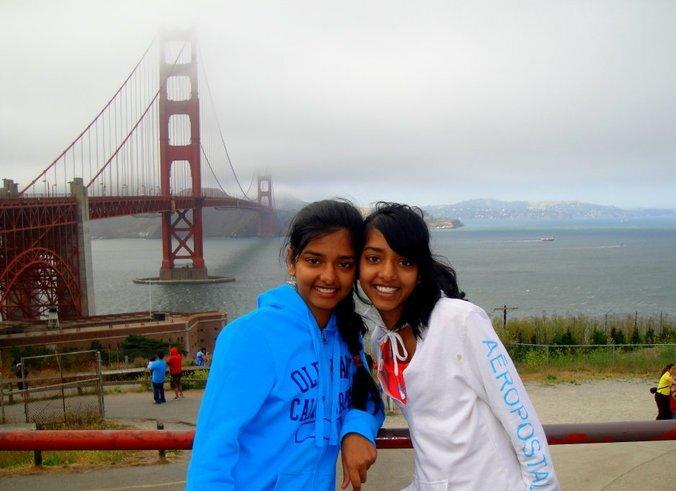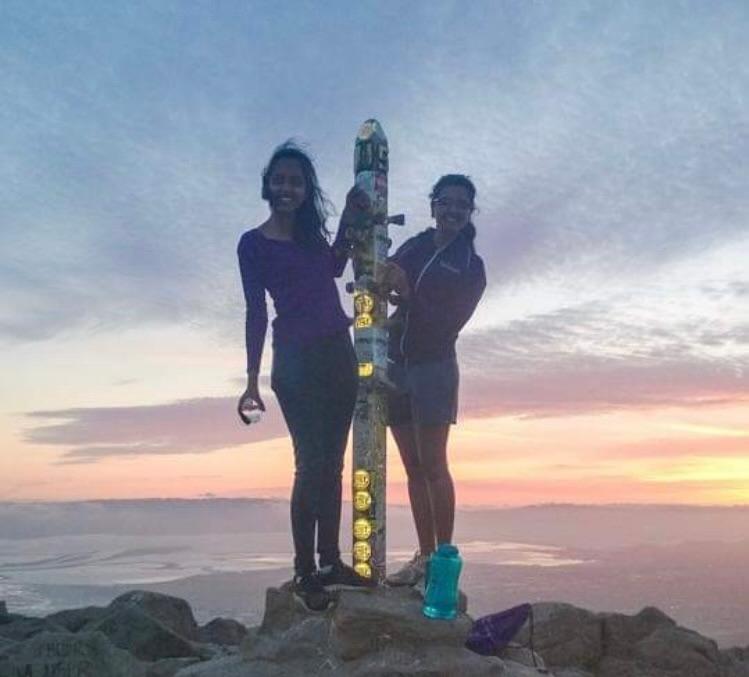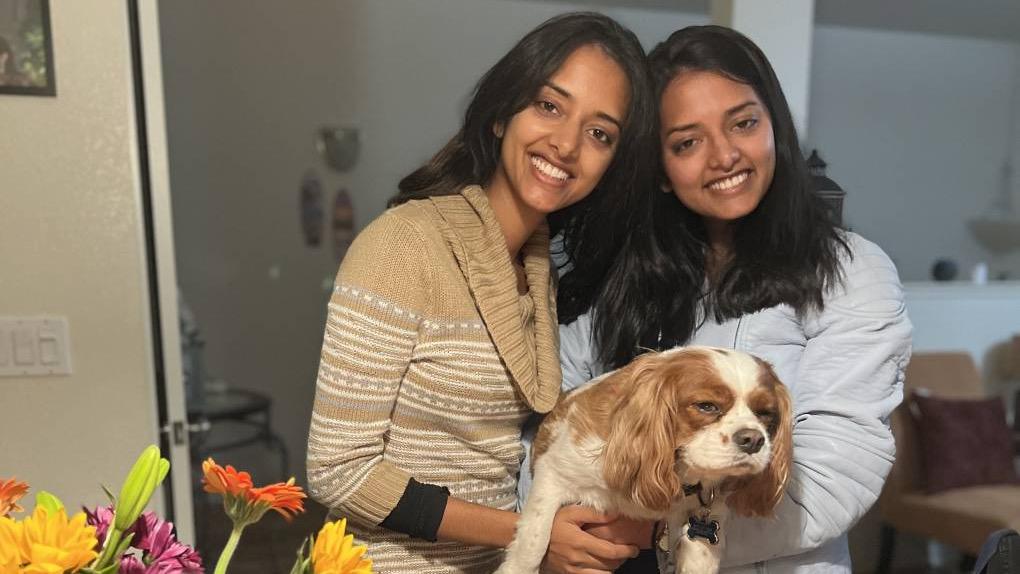Here in the US, turning 21 is usually a reason to celebrate. But for 200,000 young people, adulthood catapults them into a bizarre legal limbo thanks to the Immigration Act of 1990.
That’s what happened to Eti Sinha and her twin sister, Eva Sinha. When they turned 21, they “aged out” of their parents’ family green card application.
“It’s just the system that’s just so messed up,” Eva Sinha said.
“It’s extremely difficult to process that, and keep having more and more obstacles in your way just to continue a life — in the only place I call home.”
Many children who illegally entered the US are protected under Deferred Action Childhood Arrivals (DACA). But those, like Eti Sinha and Eva Sinha, who came legally on their parents’ work visas have no such protections. When they turn 21, even though they have lived in the US nearly all their lives, they are subject to deportation.

A family makes a bid for the American dream
The Sinha sisters were 7 years old when they moved with their mom from Delhi, India, to San Francisco. They joined their dad, who was studying to transition out of his first career in the oil industry. Now, he runs his own Silicon Valley consulting firm, and their mom is the director of admissions at a local university.
“We kind of had a pretty typical American upbringing. We learned how to ride our bikes in Golden Gate Park. We loved eating all the Asian food in San Francisco and [the] Bay Area,” Eva Sinha recalled.
In time for middle school, the family moved to the suburbs: Fremont, in the East Bay, where they did all the things you do growing up in Fremont.
“We went to Centerville Middle School and Irvington High School,” Eti Sinha said. “We hiked Mission Peak. During lunch breaks, because it was an open campus, we would rush over to 7-Eleven, grab some taquitos and rush back to campus before class started. Eva was president of the French club. I was secretary of the French club.”
“We never really felt out of place,” Eva Sinha said. “We had a lot of other friends who were immigrants, you know? Second- and third-generation immigrants — and I’ve had quite a few friends who were immigrants themselves, who came [to the US] in elementary school along with their parents.”

But there was a critical difference between them and most of their friends, a gulf that widened as they grew older: Eva Sinha’s and Eti Sinha’s presence in this country was conditional, set to expire when they turned 21.
As children, they had been dependents, riding on their father’s temporary visa status and, later, his family application for a green card, for the right to live and work in the US more or less indefinitely. When they became adults, the federal government considered Eva Sinha and Eti Sinha foreign nationals.
The green card backlog
Just after the family arrived in the US, a backlog started to develop in Washington, DC, because of a bizarre quota system set in place back in 1991.
Green card applicants from every country get roughly the same percentage of green cards given out in any one year, whether they’re from Albania or Zimbabwe, India or China. There are far more people from India and China applying, however. These two countries, in particular, have huge populations, and many highly educated individuals are attracted to the job market in Silicon Valley.
Starting in the early 2000s, year after year, their wait for green cards got longer and longer, stretching for decades for some applicants. It only dawned on the Sinha sisters in high school that their green cards might not arrive in time for college.
“Most of my friends had gotten their green card by the time they were in high school,” Eva Sinha said.
That’s what their parents presumed would happen for them. That was a big part of the reason why their family moved here from Delhi.
“Our parents applied in 2011, when we were in middle school,” Eva Sinha said. “You know, they still don’t have their green card today. So, in high school, we realized, OK, as much as our experiences are similar to our peers, we don’t actually have the same amount of opportunity.”
That’s because the lack of a green card meant that when they turned 21 while in college, during their senior year, they would suddenly switch from dependent to adult.
Suddenly, they would become ineligible for everything from in-state tuition at a public school, to all kinds of grants and loans. Some people suggested Eva Sinha and Eti Sinha apply as undocumented, to take advantage of Deferred Action for Childhood Arrivals, or DACA, programs. But they didn’t want to risk getting cut off from any pathway to citizenship.
When asked if the Sinha sisters blame their parents, Eva Sinha said no.

“They paid all their taxes,” she said. “They’ve maintained their [legal visa] statuses, made sure that, you know, that they’re following all the rules. And, you know, once their turn in line comes up, they would get their green card. It’s just, there’s a backlog.”
The Sinha sisters found a way forward. They both convinced their respective financial aid departments — at University of California, Santa Barbara and University of California, San Diego — to let them pay the lower, in-state tuition all the way through, even though they were both going to become “international” students in a few years. They got no financial aid.
After they graduated — cum laude, both of them — Eti Sinha and Eva Sinha became experts in the US visa system.
Eva Sinha currently works as a financial analyst in San Francisco, and her employer sponsored her for an H-1B, the most common visa in Silicon Valley.
That H-1B is temporary, of course. It expires in 2026, unless her employer applies for a renewal, or a green card, or she returns to her “home country,” a country she’s visited but doesn’t consider home.
“We are, like, as American as people who are American citizens,” Eva Sinha said. “We grew up here. We want to continue our lives here. We want to contribute to the American economy here. Everybody else perceives us as American as well, from our peers to my, like, managers, etcetera. I think we’re American in every way but on paper.”
“It’s so obvious to everyone but, for some reason, not the US government,” Eti Sinha added.
Eti Sinha searched for full-time work after college, but couldn’t find a company willing to sponsor her. So, she’s now on an F-1, an academic visa. “I am a PhD student at Cornell University in New York, studying biomedical engineering,” she said.
After Eti Sinha graduates, she’ll have to do the same thing as Eva: find an employer to sponsor her for an H-1B and then, hopefully, a green card. Essentially, they’re both hopscotching from one temporary visa to another, to stay in this country.
There’s a name for this dilemma, for what Eti Sinha and Eva Sinha became: “Documented Dreamers.” Most of them are Asian, with roughly 70% being Indian, according to the advocacy group Improve the Dream.
At a recent committee hearing in Sacramento, Eva Sinha testified on behalf of a bill put forward by State Sen. Maria Elena Durazo of Los Angeles. “Senate Bill 1160 will allow dependent visa students that meet existing eligibility requirements to pay in-state tuition at California’s public colleges and universities,” even after they turn 21, Durazo said at the hearing.
This bill isn’t for the Sinha sisters. It’s for the students, the “Documented Dreamers” coming after them. Even though SB 1160 can’t address federal immigration law, it can make the cost of a college education in California a little more feasible.
That’s good enough for Eva Sinha, today.
“Doing it piece by piece, at least we can get some movement going. Having one big legislation, which will definitely solve everything? In the way that our government is designed? It’s just going to take forever,” Eva Sinha said.
Their best hope now is a bill that was passed by the House of Representatives earlier this month.
“There is a realistic chance we could permanently end aging out by the end of the year,” said 26-year-old Dip Patel, founder of the advocacy group Improve the Dream, which coined the term “Documented Dreamers.”
The bill was included as an amendment to the National Defense Authorization Act, the military spending bill that must be approved each year. The Senate will now vote on its own version of the NDAA. But supporters believe that even in an election year, when many politicians are nervous about taking a stand on immigration reform, the bill will get through.
“The NDAA is a must-pass bill. So, we know that by December some form of the bill is going to become law. And the fact that we’ve got it in with bipartisan support in the House, you know, increases the odds of this becoming law,” he said.
As they watch how the bill progresses, the Sinha sisters and 200,000 young people like them are holding onto their dream of a future here in the US, the only place they’ve ever called home for the world.
Correction: An earlier version of this story misspelled a name. It has been corrected.
An earlier version of this story originally appeared on KQED.
